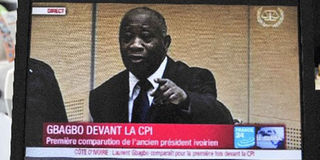Gbagbo blames France in first ICC appearance

A TV screen taken in Abidjan displays former Ivorian President Laurent Gbagbo appearing before the Hague's International Criminal Court for the first time for his role in the deadly aftermath of presidential polls last year, on December 5, 2011. Gbagbo blamed the French military for his arrest for crimes against humanity. Photo/AFP
Former Ivory Coast president Laurent Gbagbo made his first appearance Monday before the International Criminal Court where he blamed the French military for his arrest for crimes against humanity.
Gbagbo, the first ex-president to be brought before The Hague-based tribunal, faces four counts of crimes against humanity, including murder and rape, over post-election violence the UN said left about 3,000 people dead.
The 66-year-old said his arrest by followers of his rival and current president Alassane Ouattara in April was the direct result of a bombing campaign by France, Ivory Coast's former colonial ruler.
"Good afternoon madame president, thank you for letting me speak. I am Laurent Gbagbo," a gaunt looking Gbagbo said, dressed in a sombre dark suit, white shirt and black tie for his appearance.
"I was arrested under French bombs," said Gbagbo, who was transferred to The Hague from his northern Ivorian jail cell on Wednesday. "It was the French army that did the job."
Judge Silvia Fernandez de Gurmendi said Gbagbo must reappear on June 18 for a confirmation of charges hearing when he will learn whether he must stand trial for crimes committed by his troops after he refused to accept defeat in a November 2010 presidential run-off.
His transfer to the ICC last week drew a furious reaction from his supporters and set a tense backdrop for the December 11 parliamentary poll that had been billed as a chance to foster reconciliation in the war-weary country.
Gbagbo spent a decade at the helm of Ivory Coast, the world's number one cocoa exporter, but violence erupted after he refused to accept results from the 2010 election proclaiming victory for Ouattara.
The ICC had issued a sealed arrest warrant against him on November 23 for charges relating to violence allegedly committed by forces loyal to Gbagbo between December 16, 2010 and April 12, 2011.
At the next hearing prosecutors must convince the judges they have enough evidence to take him to trial over the charges of murder, rape, persecution and other inhuman acts.
When ICC judges authorised an investigation into Gbagbo earlier this year, they said there were "reasonable grounds" to believe his camp hired and armed some 4,500 mercenaries, including fighters from neighbouring Liberia.
According to figures provided by the ICC chief prosecutor's office, between 700 and 1,048 people were killed by pro-Gbagbo forces.
Gbagbo's camp described his transfer to The Hague as a "political kidnapping" and announced it would boycott the December election and pull out of reconciliation efforts.
His advisor Toussaint Alain denounced the case before the ICC.
"The presence of president Laurent Gbagbo in the dock is clearly a judicial error, a swindle, a move to liquidate him politically, socially and physically," Alain said in a statement issued in The Hague.
Gbagbo supporters see the hand of Ouattara, who took office as president in May after his forces arrested Gbagbo with UN and French military backing, in their leader's transfer and have branded him a Western puppet.
But Charles Ble Goude, Gbagbo's firebrand youth leader, said the ICC was the ideal stage to confound Ouattara.
"The truth comes out now, with Laurent Gbagbo holding the floor Monday and for the coming months," he said in an "open letter to all Ivorians and Africans" released on Sunday.
A government spokesman in Abidjan had hailed the transfer as an opportunity to give the country closure over the bloody episode.
But human rights groups warned last week any prosecution focused only on crimes committed by forces loyal to Gbagbo and not those of Ouattara would lead to an "explosive situation on the ground".
ICC prosecutor Luis Moreno-Ocampo has promised an "impartial investigation" aimed at three to six people and said after Gbagbo's transfer: "This is just the beginning."
The Hague-based court, founded in 2002, is the first permanent international criminal tribunal to prosecute perpetrators of genocide, crimes against humanity and war crimes.
The ICC's six other cases also relate to crimes committed in Africa.




